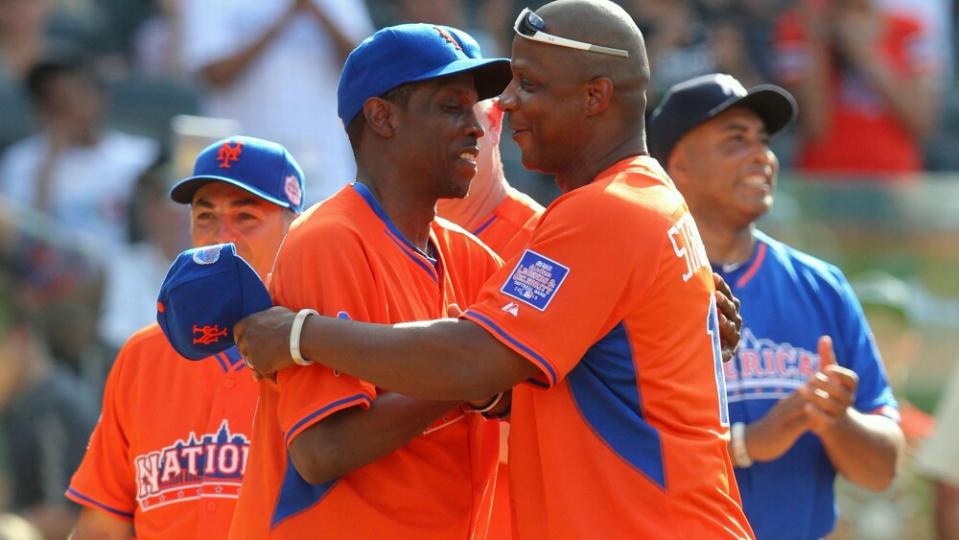Mets to honor Darryl Strawberry and Dwight Gooden with retired numbers

NEW YORK — Darryl Strawberry and Dwight Gooden thought back to what might have been, how their starry accomplishments would have been so much greater had they not succumbed to the drugs and alcohol that shattered their careers.
On the day the New York Mets announced they will retire Gooden’s No. 16 on April 14 and Strawberry’s No. 18 on June 1, the pair held a Zoom news conference and candidly discussed their failures to resist the fame and fortune that followed the swashbuckling Mets’ 1986 World Series title, leading to prison and a string of suspensions that perhaps cost them entry to baseball’s Hall of Fame.
“We were mentally crazy at the time, so we needed a lot help,” Strawberry said. “We could have used every doctor and every psychiatrist — they probably would have ran away from us every time because we were so young and so focused on what it was like to be on the field and doing what we was doing on the field and we was not taking care of ourselves.”
Strawberry, 61, was an eight-time All-Star, including seven during his time with the Mets from 1983-90. He hit .259 with 335 homers, 1,000 RBIs and 221 stolen bases in 17 seasons.
“My heart and soul bleed blue and orange,” Strawberry said of the Mets colors. “Always have. Always will.”
He recommended star first baseman Pete Alonso, who can become a free agent next fall, not depart like Strawberry did when he signed with the Los Angeles Dodgers for the 1991 season.
“I just hope Pete doesn’t leave because I ended up personally with a bellyful of regrets for leaving because there is nothing like playing in New York. There is nothing like the atmosphere. There is nothing like the fans. There is nothing like being booed and fans letting you know when you suck,” Strawberry said.
Gooden, 59, was a four-time All-Star while playing for the Mets from 1984-94, winning the 1984 NL Rookie of the Year and the 1985 NL Cy Young Award. He went 194-112 with a 3.51 ERA and 2,293 strikeouts in 16 seasons.
“I remember at times literally crying, going to get drugs, crying to go buy alcohol. That’s a problem. That’s a mental problem,” Gooden said, recalling his last descent in 2019. “Last time, instead of going to rehab, I put myself into a mental hospital.”
Gooden was 157-85 with a 3.10 ERA with 1,875 strikeouts for the Mets, and Strawberry hit hit .263 with 252 homers, 733 RBIs and 191 steals for New York.
“I was never well. Had I been well, what could I have done?” Strawberry said. “When I was young, I thought this was going to go on forever, I’m going to be hitting home runs forever.”
Gooden recounted being rebuffed by Mets general Steve Phillips when he hoped to return for the 1998 and 2000 seasons.
“Their fans will always be special to me. They cared about me and believed in me when I didn’t believe in myself and gave me hope to go on,” Gooden said. “That’s something that you don’t forget.”
Strawberry contrasted his background with that of Yankees captain Derek Jeter, his teammate from 1995-99.
“You look at a lot of guys that played in New York that was young, like Jete, but he had a great family and I admire that because that helped him get through life better with the expectations and the pressures of playing. When you don’t have anybody, it’s very challenging for you to make the right decisions.”
Mets players were celebrated in the bars and nightclubs of 1980s New York.
“Did we get safeguarded when we were planning in New York at a young age? Probably not. I don’t think so. Everything was wide open,” Strawberry said. “Twenty-one years old, running into Manhattan, I don’t think that was a good idea. I don’t think that was a good lifestyle for me. I got kind of corrupted in that lifestyle and I kick myself for that.”
“I could have stayed on track and followed what Gary Carter and Mookie Wilson was living,” he added, “I probably would’ve ended up one heck of a ballplayer in Queens for the rest of my career.”
New York previously retired No. 14 (Gil Hodges, 1973), No. 17 (Keith Hernandez, 2022), No. 24 (Willie Mays, 2022), No. 31 (Mike Piazza, 2016), No. 36 (Jerry Koosman, 2021), No. 37 (Casey Stengel, 1965), No. 41 (Tom Seaver, 1988). In addition, Jackie Robinson’s No. 42 was retired throughout Major League Baseball in 1997.
At times, the troubles of Strawberry and Gooden led to a strained relationship and criticism of each other.
“You’re talking about two young Black, African-Americans playing in New York, stars, and everything handed to you. You go to Manhattan, you get everything handed to you. You get free clothes, You get free this — how do you suppose to respond to that when you’re young?” Strawberry said. “The animosity wasn’t about not loving and caring for Doc. I always have. He’s always been a knucklehead, and I’ve always been a knucklehead. He knows that. We both know that for each other.”

